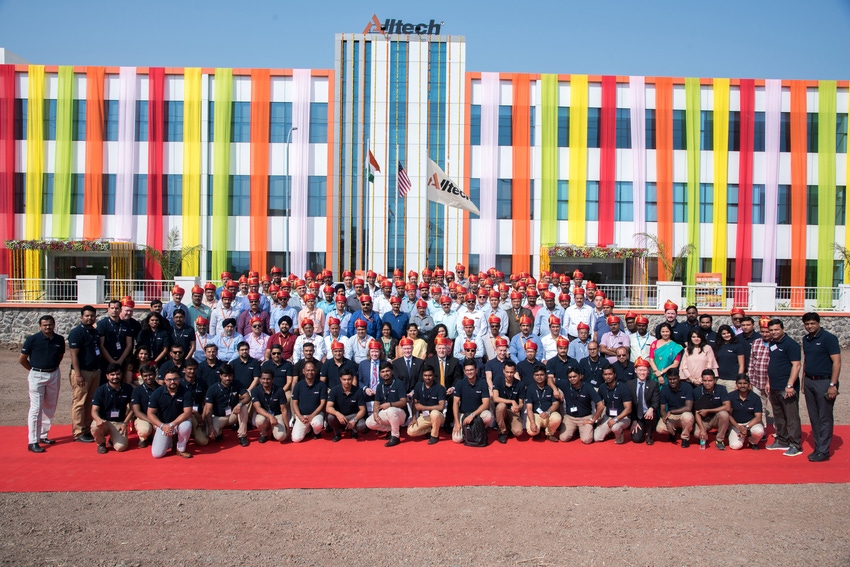Alltech opens trace mineral manufacturing facility in India
Pune facility in India to be Asia’s largest organic trace mineral manufacturing operation; Alltech also opens office in Nepal.

Alltech has expanded its presence in South Asia, officially opening a state-of-the-art trace mineral manufacturing plant in Pune, India, on Oct. 27, a few days after it opened its sales and support office in Kathmandu, Nepal.
With a production capacity of 25,000 tons per year, the Pune facility will be the largest organic trace mineral plant in Asia, Alltech said.
The global company noted that it opened Alltech India in 2001, with production operations in Bengaluru, India, beginning in 2004. Over the years, Alltech India has grown 20-fold, serving poultry, dairy and aquaculture feed mills and farmers to improve their efficiency and profitability.
“When we outgrew our plant capacity in 2016 and decided to expand our business and invest in a bigger plant, Pune was the first choice,” said Dr. Mark Lyons, president and chief executive officer of Alltech. “Pune is one of India’s fastest-growing cities. With a cosmopolitan population of over 5 million people, proximity to the port and speedy development, this was an ideal place for us to serve our customers in a more efficient way.”
“The Chakan industrial area is considered as one of the best,” noted Dr. Aman Sayed, managing director of Alltech India and regional director of South Asia. “The Maharashtra Industrial Development Corp. has developed this area, which stretches 246 hectares, with basic as well as high-grade-quality facilities.”
The Pune facility was designed to cater not only to the local market but to South Asia and Southeast Asia, Australia and Europe as well, Alltech said. The plant covers a total area of 132,000 sq. ft. and employs 50 full-time team members. The Pune facility features modern scientific technology and utilizes advanced quality systems, Alltech noted.
“The plant is equipped with features such as natural gas as its energy source for reducing carbon emissions, fire hydrant systems ensuring safety and segregated docks for raw material and finished products, enabling free movement of vehicles and clear demarcation and traceability of material in and out of the facility,” Sayed said.
“We have a fully-fledged lab for testing our raw materials and finished goods internally, ensuring that they meet our quality standards and guarantees before being shipped out to customers,” added Raghu Saraki, quality manager, South Asia. “We are required to follow the Alltech Quality System and our Alltech Q+ [Quality Plus] program, ensuring the quality, safety and traceability of every batch of product manufactured here.”
The Alltech Quality System delivers the same level of quality assurance and traceability in each of Alltech's geographical markets, based on standardized processes designed to meet and exceed other third-party systems of certification as well as global regulations, the company said.
Alltech noted that the facility will soon obtain certifications such as ISO22000:2005 (for food safety management), FAMI-QS certification (for European food standards) and ISO14000:2015 (for environmental management).
While addressing the audience at the Pune facility opening, Lyons said Alltech intends to continue making investments in the region.
Nepal office
Alltech officially opened its Nepal sales and support office in Kathmandu on Oct. 25, 2018. Alltech has operated in Nepal for 16 years, and the company said it witnessed 60% growth in its business within the country last year.
Approximately 80% of Nepal’s population is engaged in agricultural work, and the agriculture sector contributes to nearly 30% of Nepal’s gross domestic product.
“The growth of the feed market [in Nepal] is quite significant, and we are the first animal health company to enter into the market,” Lyons said at the office opening.
“To best serve our customers, we decided to establish an Alltech regional office in Kathmandu,” Lyons continued. “Our team in Nepal is committed to supporting feed manufacturers and farmers as they meet the growing demand for meat and milk.”
Dairy production is a growing agricultural sector in Nepal. With a well-established presence in India — the world’s largest producer of milk — Alltech plans to share best practices with neighboring country Nepal. Given that Nepal’s milk production currently trails demand by approximately 100,000 liters per day, Alltech said there is a significant opportunity to provide value through its nutritional technologies and technical expertise.
“Kathmandu was a sensible choice for us and for our clients,” Sayed said. “Our goal is to ensure that producers in Nepal get the timely service and support they need.”
The company has had a presence in the Asia Pacific market since 1986 through its first distributor in Japan and established its first Asian office in Beijing, China, in 1994.
Founded in 1980 by Irish entrepreneur and scientist Dr. Pearse Lyons, Alltech discovers and delivers solutions for the sustainable nutrition of plants, animals and people. With expertise in yeast fermentation, solid-state fermentation and the science of nutrigenomics, Alltech is a leading producer and processor of yeast additives, organic trace minerals, feed ingredients, premix and feed.
About the Author(s)
You May Also Like

.png?width=300&auto=webp&quality=80&disable=upscale)

